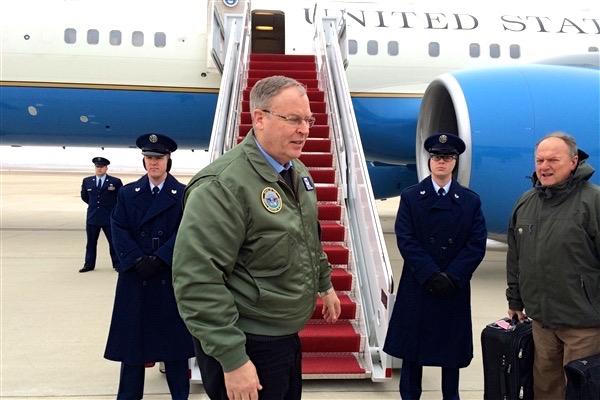DepSecDef Work Invokes ‘Space Control;’ Analysts Fear Space War Escalation
Posted on
COLORADO SPRINGS: Citing “increasing threats” against America’s satellites, Deputy Defense Secretary Bob Work said here today that the US military “must be able to respond in an integrated, coordinated fashion” to attacks on US space assets and he used the charged term “space control” in making his argument.
“While we rely heavily on space capabilities, in both peace and war, we must continue to emphasize space control as challenges arise,” he told an audience at a classified session here. “To maintain our military dominance we must consider all space assets, both classified and unclassified, as part of a single constellation. And if an adversary tries to deny us the capability, we must be able to respond in an integrated, coordinated fashion.”
Work’s spokesman, Lt. Cmdr. Courtney Hillson, provided a summary of his remarks, which were made during a classified session at the Space Symposium here.
In a clear message aimed at America’s competitors in space — principally China and Russia — Work said the US military “will maintain space capabilities, through all phases of conflict, regardless of actions to deny us the ultimate high ground.”
Breaking D readers will remember that China tested an anti-satellite system last July, a test that Lt. Gen. Jay Raymond of the 14th Air Force said yesterday was “successful.” The very clear but quiet ramp up in language about offensive space capabilities, space control and other active measures has become clear since that test.
Work’s comments at the premier space event of the year sparked concern among space warfare experts.
“His remarks seem to be part of a concerted effort by the national security establishment to prime the pump so to speak for a more active counter space program for the United States,” Victoria Samson, a top space analyst at the Secure World Foundation said in an email. “What I find interesting is the connection between classified and unclassified space programs. It seems to be elevating the unclassified programs to a point where the United States would have to treat them the same as if an attack was on a classified satellite. That would imply that things can escalate pretty quickly should we come into a time of hostility. It also means there is more room for misunderstanding, misinterpretation, or mistrust.”
Sampson and Theresa Hitchens, a scholar the University of Maryland’s Center for International and Security Studies and former director of the United Nations Institute for Disarmament Research in Geneva, both noted Work’s use of the words “space control.”
“Perhaps the most significant aspect of Work’s remarks is his use of the term ‘space control’ as a response to the increased threat environment. Space control, as a term of art in military space circles, has a connotation regarding offensive activities,” Hitchens said in an email. (Emphasis ours). “We haven’t seen an emphasis on ‘space control’ during the Obama administration (despite Work’s reference to ‘continuing emphasis’). Rather the buzzword in national security space has been ‘strategic restraint’ — with an emphasis on promoting multilateral approaches to shaping the space environment.”
The language used by Gen. John Hyten, head of Air Force Space Command, and several other senior Air Force space officers in recent months, about defending American space assets has grown much sharper in recent months. When pressed for details about space control or offensive space capabilities they have declined to discuss details, citing the fact almost all of the work is classified.
This is not occurring in a domestic vacuum. Last year’s National Defense Authorization Act included requirements for “a strategy relating to space control and space superiority for the protection of national security space assets.” It also earmarked the majority of funds appropriated to the Space Security and Defense Program for “the development of offensive space control and active defensive strategies and capabilities.” That program used to be known as the Space Protection Program (SPP). So Congress is clearly worried about protecting our space architecture as well.
“We need to make a renewed commitment to protect our space assets, and we haven’t done that,” Rep. Randy Forbes, chairman of the House seapower subcommittee, told my colleague Sydney Freedberg. “That’ll require probably about a billion dollars a year” above current spending.
“Given the general tenor of the rhetoric coming out of the military space and intelligence communities in recent months about increasing threats and the need for more effective responses, especially regarding improving deterrence, one has to wonder if there is an ongoing strategic shift in their thinking regarding offensive capabilities and systems (or at a minimum “active defenses”.),” Hitchens wrote. “The tone of the discussion, which seems to reflect more aggressive attitudes on threat response, reminds me of the time period at the end of the Clinton Administration. At that time, senior USAF officials in particular were openly agitating for a more offense-oriented National Space Policy and taking actions (such as the issuance of a new Air Force Space Doctrine) that sought to create “facts on the ground” to that effect prior to the start of a new administration. While I have no hard evidence this is the current case, the parallels are pretty striking.”
Sydney Freedberg contributed to this article.
Subscribe to our newsletter
Promotions, new products and sales. Directly to your inbox.

